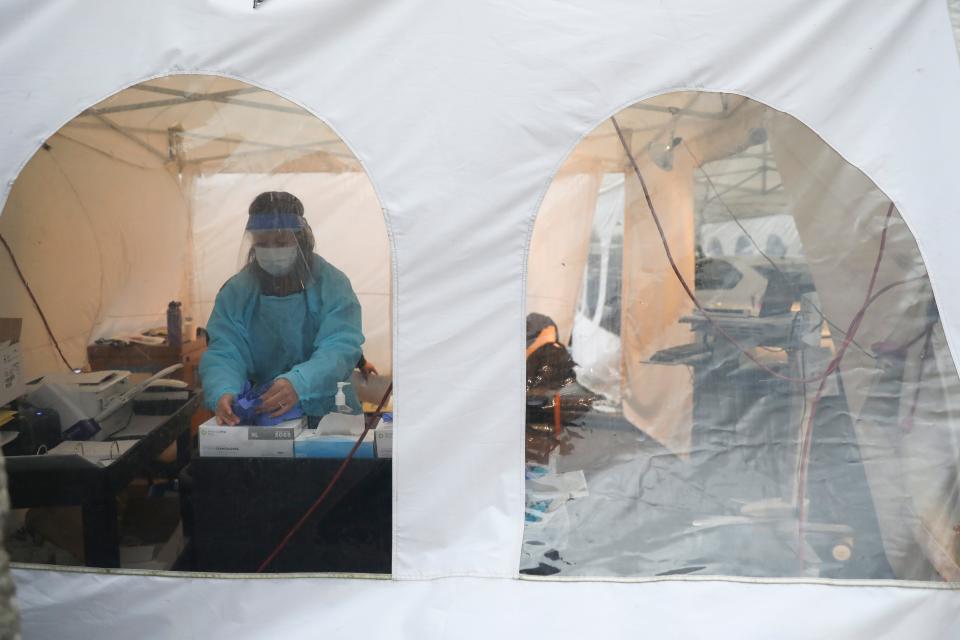As Oregon coronavirus cases soar, officials prepare for record hospitalization peak

Coronavirus cases in Oregon repeatedly surged to all-time high levels this week, and public health experts warn tens of thousands more Oregonians are likely to be infected by the end of the month.
An unprecedented spike in hospitalizations is also on the horizon as the omicron variant continues to sweep the state, but its severity appears to be less than the delta variant.
The new record for reported daily cases is 10,451, set on Friday. The highest level prior to the omicron variant was about 3,200.
Dr. Dean Sidelinger, state epidemiologist with the Oregon Health Authority, said the daily numbers are certainly an undercount of actual infections, with the state likely reporting no more than 50-70% of actual infections.
Student athletes: Salem schools announce new coronavirus guidelines for sports, extracurricular activities
Many people might be asymptomatic and not realize they have the virus, while others might not have been tested by a medical professional. The state has no way to record cases of individuals testing positive with at-home test kits.
The public is being urged to wear quality masks, avoid large gatherings and get vaccinated or boosted, if eligible, as the highly infectious omicron variant continues to sweep across the country.
“It will disrupt lives and livelihoods. Unchecked, it will overburden our already exhausted health care workers and oversaturate our health care system,” Sidelinger said.
Forecasting released Friday from Oregon Health and Science University predicts a late-January peak of 1,652 people taking up hospital beds in Oregon sickened by the omicron variant. That would be 30% higher than the delta variant's hospitalization peak of 1,200 people in September.
Less severe but still deadly
Data from counties comparable to the United States that experienced the omicron variant first — South Africa, the United Kingdom and Denmark — has suggested the omicron variant causes less-severe symptoms than the delta variant, particularly among vaccinated people.
Jasmin Chaudhary, medical director of infection prevention at Salem Health, said studies have shown omicron causes less disease in the lungs, which could be part of the reason it is causing less dire outcomes.
But she said most of the studies on omicron are from communities with high vaccination or immunity rates. High rates of hospitalization are still likely in unvaccinated communities.
A study out of Denmark cited by OHSU in its recent modeling concluded that vaccinated but un-boosted individuals have nearly the same rate of infection from omicron as unvaccinated people.
Individuals with booster shots reduce their risk of transmission by 50% compared to vaccinated people, the study found.
Rapid tests: How Oregon, US schools are staying open amid COVID surge
Other studies have concluded omicron could be up to three times as infectious as the delta variant.
So while the hospitalization rate among people infected with omicron is likely to be lower than delta, the sheer number of those infected is expected to push hospitalizations to all-time pandemic highs.
The less-severe omicron is also likely to result in shorter hospital stays than were seen during delta's peak, but "that doesn’t help with the all-at-once impact on hospital capacity that we’re going to see," said Peter Graven, lead data scientist at OHSU's Business Intelligence unit.
"We are seeing these levels in states on the East Coast and know they are coming to Oregon," Graven said.
Preparing for a surge
OHA's chief medical officer Dana Hargunani said the public health authority on Friday released to hospitals a crisis care tool staff can utilize to ensure that if decisions need to be made about who receives care at overburdened hospitals, hospital staff can made those decisions in an unbiased manner.
The tool is "focused on equity," which is particularly crucial when medical personnel are making difficult decisions about who is going to receive potentially life-saving care and who is not.
Hargunani said the tool has been in development over the past couple of years as the state has learned about the pandemic and observed other states release similar tools for their hospitals.
"This is a very difficult topic to consider and to work on,” Hargunani said.

At Salem Hospital, medical staff said they have been preparing for surges since the beginning of the pandemic, but have yet to see a major spike from omicron.
According to Sarah Horn, chief nursing officer at Salem Health, the hospital has about 50 COVID-19 patients right now, and by early-to-mid February expects to see a maximum of about 100, similar to what it saw during the delta surge.
Unlike with delta, Horn said, they don't expect most of these patients to be critically ill, which will reduce some of the pressure on the hospital staff and supplies.
Salem Hospital is already above 100% capacity, including hitting 119% capacity on Tuesday, Horn said, and have needed to double-book some rooms or place patients in larger rooms with curtain dividers.
“We will make room for those who need care from us, for sure,” Horn said.
Gov. Kate Brown announced Friday up to 500 members of the Oregon National Guard will be sent to local hospitals to support health care personnel facing the approaching surge.
The first 125 Guard members will be deployed next week.
Those deployed will assist hospital staff with non-clinical needs, including testing and equipment delivery. Guard members with medical training will not be deployed.
“With more than 500 current hospitalizations and daily record-breaking numbers of COVID-19 cases, we are at another critical point in this pandemic — and the Oregon National Guard is stepping up again to assist,” Brown said in a statement.
How Oregon compares to other states
As of Thursday, Oregon had a seven-day average daily case count of 4,001, or 95 per 100,000, according to the New York Times coronavirus case tracker.
Those numbers are well above the delta variant peak from early September, but still lower than many other states.
Oregon's per 100,000 daily average for new cases is 12th lowest among the 56 entities tracked by the New York Times (50 states, Washington, D.C., and five U.S. territories).
As far as Oregon's neighbors, Washington state had a rate of 124 cases per 100,000, California was at 157 per 100,000, Idaho at 51 per 100,000 and Nevada at 104 per 100,000.
In general, states in the East, South and parts of the Midwest currently have much higher case counts than Western states.
“It’s kind of like being at the beach and someone’s out there and gets a wave and you’re a bit closer to shore and you get the wave next,” said Marcel Curlin, associate professor of medicine in infectious diseases at OHSU.
Public heath experts said there is still time to take preventative steps that could brunt the impact of the coming omicron spike.
They encouraged Oregonians to get vaccinated and boosted, if eligible, as well as continue the tried-and-true methods that limit the spread of COVID-19: wearing masks, maintaining physical distance and washing hands often.
“It’s still the same virus. It’s a different variant, but it’s still COVID. It still spreads in the same way that it does, causes the same kinds of problems that it has been," Curlin said. "The main steps to avoid getting infected and avoid harm to your family, close contacts, loved ones is still the same as it was.”
Reporter Connor Radnovich covers the Oregon Legislature and state government. Contact him at cradnovich@statesmanjournal.com or 503-399-6864, or follow him on Twitter at @CDRadnovich.
This article originally appeared on Salem Statesman Journal: Record-shattering spike: Officials prepare for hospitalization surge

